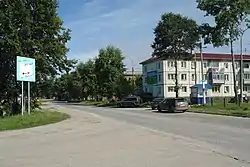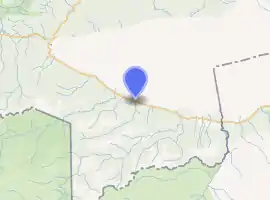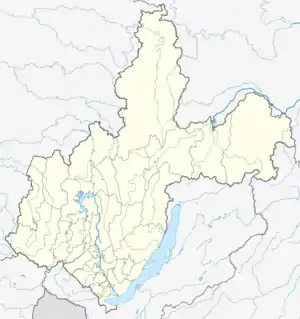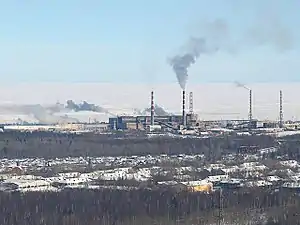Baykalsk
Baykalsk (Russian: Байкальск, IPA: [bɐjˈkalʲsk]) is a town in Slyudyansky District of Irkutsk Oblast, Russia, located 41 kilometers (25 mi) from Slyudyanka, the administrative center of the district. Population: 13,583 (2010 Census);[4] 15,727 (2002 Census);[9] 16,406 (1989 Census).[10]
Baykalsk
Байкальск | |
|---|---|
Town[1] | |
 In Baykalsk | |
.svg.png.webp) Flag | |
Location of Baykalsk 
| |
 Baykalsk Location of Baykalsk  Baykalsk Baykalsk (Irkutsk Oblast) | |
| Coordinates: 51°31′N 104°08′E | |
| Country | Russia |
| Federal subject | Irkutsk Oblast[1] |
| Administrative district | Slyudyansky District[2] |
| Founded | 1961[3] |
| Town status since | 1966 |
| Elevation | 460 m (1,510 ft) |
| Population | |
| • Total | 13,583 |
| • Estimate (2018)[5] | 12,629 (−7%) |
| • Municipal district | Slyudyansky Municipal District[6] |
| • Urban settlement | Baykalskoye Urban Settlement[6] |
| • Capital of | Baykalskoye Urban Settlement[6] |
| Time zone | UTC+8 (MSK+5 |
| Postal code(s)[8] | 665930, 665932 |
| Dialing code(s) | +7 39542 |
| OKTMO ID | 25634108001 |
History
It was founded in 1961[3] with the opening of a paper mill at Lake Baikal, called Baykalsk Paper and Pulp Mills.
In the late 2000s, Baykalsk faced a series of well-documented economic crises stemming from its status as a monotown entirely dependent on the declining paper mill it was founded around.
Administrative and municipal status
Within the framework of administrative divisions, Baykalsk is subordinated to Slyudyansky District.[2] As a municipal division, the town of Baykalsk, together with two rural localities in Slyudyansky District, is incorporated within Slyudyansky Municipal District as Baykalskoye Urban Settlement.[6]
Economy

Baykalsk Paper and Pulp Mills was a major source of pollution of Lake Baikal.[11] About 3,500 people were directly employed by the plant. The plant was closed in 2009 after new expensive waste water treatment equipment made the factory unprofitable after the global economic downturn.[11][12] In Soviet times, the factory management was primarily responsible for the town's maintenance. The town and plant administrations were independent from one another but 95% of the town's budget used to come from the plant in the form of taxes. In January 2010, following disturbances, the Russian government with the cooperation of its private owner reopened the factory and exempted it from pollution rules but lowered the workers' wages. [13] In September 2013, the mill underwent a final bankruptcy, with the last eight hundred workers slated to lose their jobs by December 28, 2013.[14]
Infrastructure
There are nine kindergartens, three theaters, and a new sports center in the town. The residential parts mostly consist of three- and five-story apartment blocks.
References
Notes
- Charter of Irkutsk Oblast
- Registry of the Administrative-Territorial Formations of Irkutsk Oblast
- Энциклопедия Города России. Moscow: Большая Российская Энциклопедия. 2003. p. 32. ISBN 5-7107-7399-9.
- Russian Federal State Statistics Service (2011). "Всероссийская перепись населения 2010 года. Том 1" [2010 All-Russian Population Census, vol. 1]. Всероссийская перепись населения 2010 года [2010 All-Russia Population Census] (in Russian). Federal State Statistics Service.
- "26. Численность постоянного населения Российской Федерации по муниципальным образованиям на 1 января 2018 года". Federal State Statistics Service. Retrieved January 23, 2019.
- Law #72-oz
- "Об исчислении времени". Официальный интернет-портал правовой информации (in Russian). June 3, 2011. Retrieved January 19, 2019.
- Почта России. Информационно-вычислительный центр ОАСУ РПО. (Russian Post). Поиск объектов почтовой связи (Postal Objects Search) (in Russian)
- Russian Federal State Statistics Service (May 21, 2004). "Численность населения России, субъектов Российской Федерации в составе федеральных округов, районов, городских поселений, сельских населённых пунктов – районных центров и сельских населённых пунктов с населением 3 тысячи и более человек" [Population of Russia, Its Federal Districts, Federal Subjects, Districts, Urban Localities, Rural Localities—Administrative Centers, and Rural Localities with Population of Over 3,000] (XLS). Всероссийская перепись населения 2002 года [All-Russia Population Census of 2002] (in Russian).
- "Всесоюзная перепись населения 1989 г. Численность наличного населения союзных и автономных республик, автономных областей и округов, краёв, областей, районов, городских поселений и сёл-райцентров" [All Union Population Census of 1989: Present Population of Union and Autonomous Republics, Autonomous Oblasts and Okrugs, Krais, Oblasts, Districts, Urban Settlements, and Villages Serving as District Administrative Centers]. Всесоюзная перепись населения 1989 года [All-Union Population Census of 1989] (in Russian). Институт демографии Национального исследовательского университета: Высшая школа экономики [Institute of Demography at the National Research University: Higher School of Economics]. 1989 – via Demoscope Weekly.
- "Oleg Deripaska pays up". The Daily Telegraph. London. June 12, 2009. Retrieved August 18, 2010.
- "Siberian Town silenced by downturn". BBC News. September 14, 2009. Retrieved August 18, 2010.
- Levy, Clifford J. (November 8, 2010). "Last Gasp for Factory Bequeathed by Soviets". The New York Times. Retrieved November 9, 2010.
- Nemtsova, Anna (November 30, 2013). "Tide of discontent sweeps through Russia's struggling 'rust belt'". NBC News. Archived from the original on December 15, 2013. Retrieved March 11, 2015.
Sources
- Законодательное Собрание Иркутской области. Постановление №9/5-ЗС от 15 апреля 2009 г. «Устав Иркутской области», в ред. Закона №2-У от 14 декабря 2017 г. «О поправках к Уставу Иркутской области». Вступил в силу по истечении десяти дней после дня официального опубликования. Опубликован: "Областная", №45, 24 апреля 2009 г. (Legislative Assembly of Irkutsk Oblast. Resolution #9/5-ZS of April 15, 2009 Charter of Irkutsk Oblast, as amended by the Law #2-U of December 14, 2017 On the Amendments to the Charter of Irkutsk Oblast. Effective as of the day following a ten-day period after the day of the official publication.).
- Законодательное Собрание Иркутской области. Закон №72-оз от 2 декабря 2004 г. «О статусе и границах муниципальных образований Слюдянского района Иркутской области», в ред. Закона №11-ОЗ от 14 января 2014 г. «О преобразовании рабочего посёлка Байкал (порт) Слюдянского района Иркутской области, распространении действия Закона "О статусе и границах муниципальных образований Слюдянского района Иркутской области" на всю территорию нового субъекта Российской Федерации — Иркутской области и внесении в него изменений». Вступил в силу с 31 декабря 2004 г., но не ранее чем через 10 дней со дня официального опубликования. Опубликован: "Восточно-Сибирская правда", №248–249, 14 декабря 2004 г. (Legislative Assembly of Irkutsk Oblast. Law #72-oz of December 2, 2004 On the Status and Borders of the Municipal Formations of Slyudyansky District of Irkutsk Oblast, as amended by the Law #11-OZ of January 14, 2014 On Transforming the Work Settlement of Baykal (port) in Slyudyansky District of Irkutsk Oblast, on Expanding the Scope of the Law of Irkutsk Oblast "On the Status and Borders of the Municipal Formations of Slyudyansky District of Irkutsk Oblast" to the Whole Territory of the New Federal Subject of the Russian Federation—Irkutsk Oblast—and on Amending It. Effective as of December 31, 2004, but not earlier than 10 days after the official publication date.).
- Registry of the Administrative-Territorial Formations of Irkutsk Oblast (in Russian)